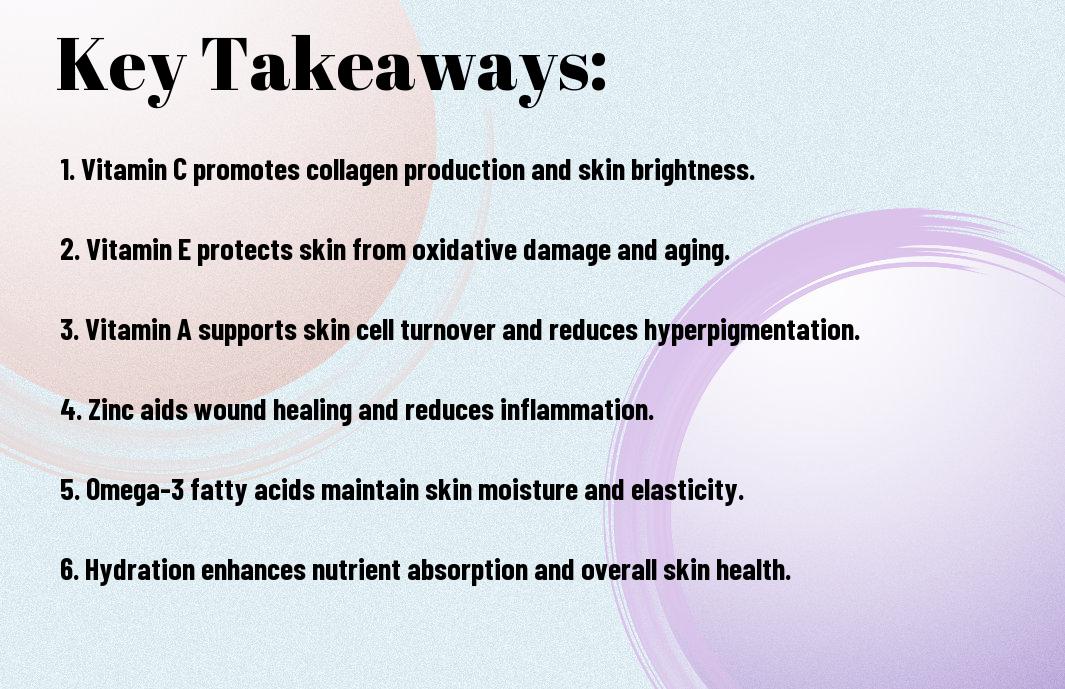
Skin health is vital, especially for African American women, who often face unique challenges like hyperpigmentation and dryness. I believe it’s vital to incorporate specific vitamins and nutrients into your diet to support radiant skin. Nutrients such as Vitamin E, Vitamin C, and Omega-3 fatty acids play a significant role in moisturizing, healing, and protecting your skin. In this post, I will explore these vital elements and provide tips on how to seamlessly include them in your daily routine to achieve that vibrant, glowing complexion you desire.

Key Takeaways:
- Vitamin D plays a significant role in skin health, with many African American women experiencing lower levels due to higher melanin content in the skin, which can reduce UV absorption.
- Antioxidants like vitamins C and E help combat oxidative stress, promoting an even skin tone and reducing signs of aging.
- Omega-3 fatty acids support skin hydration and barrier function, which can be beneficial in maintaining healthy skin moisture levels.
- Biotin supports the health of skin, hair, and nails, helping to improve overall appearance and texture.
- Vitamin A and its derivatives, such as retinoids, promote cell turnover and can help in managing skin conditions like hyperpigmentation and acne.
- Hydration is crucial; drinking adequate water and consuming foods high in water content aids in maintaining skin elasticity and appearance.
- A diet rich in fruits, vegetables, whole grains, and lean proteins provides crucial nutrients that collectively nurture skin health and combat inflammation.

The Unique Skin Needs of African American Women
Melanin and Skin Resilience
Melanin provides African American skin with greater resilience against UV damage and environmental stressors. This increased pigmentation does more than just confer a beautiful hue; it also offers some natural protection against sunburn and premature aging. However, this doesn’t mean you can skip sunscreen. I’ve discovered that even darker skin can experience complications from sun exposure, emphasizing the need to adapt our skincare routines with protective measures in place.
Common Skin Concerns in African American Women
Issues like hyperpigmentation, acne, and dry skin often surface for African American women. Factors such as hormonal fluctuations and the use of certain hair products can contribute to these challenges. In my practice, I find that many of my clients express frustration over uneven skin tones, dark spots, and the effects of acne scarring. Each of these concerns can vary in severity but often requires targeted solutions.
Hyperpigmentation, particularly post-inflammatory hyperpigmentation, is a frequent concern due to the higher melanin content in your skin, which can lead to darkening after inflammation. Additionally, *acne* might present differently, with some experiencing cystic lesions rather than typical whiteheads. Dry skin can also be pronounced in African American women, often exacerbated by environmental factors. In my experience, addressing these issues requires tailored approaches that consider both the protective qualities of melanin and the specific triggers of these common skin challenges.

The Role of Vitamins in Skin Health
Vitamin E: The Antioxidant Powerhouse
Vitamin E is known for its strong antioxidant capabilities, which help combat oxidative stress and protect your skin from environmental damage. This vitamin not only aids in maintaining skin hydration but also promotes skin repair by stabilizing cell membranes and reducing inflammation. Incorporating vitamin E into your skincare routine can truly enhance your skin’s overall appearance and texture.
Vitamin C: The Brightening Agent
Famed for its role in collagen synthesis, vitamin C can dramatically improve your skin’s luminosity. This powerful nutrient helps to diminish dark spots and promotes an even skin tone by inhibiting melanin production. With consistent use, you’ll likely notice brighter and more radiant skin.
The benefits of vitamin C extend beyond just brightening; it’s also a potent antioxidant that helps fend off free radicals. This means that not only does it help reduce hyperpigmentation and improve skin texture, but it also shields your skin from pollutants and other harmful environmental factors. You may consider incorporating vitamin C serums into your daily regimen to optimize your skin’s health.
Vitamin D: The Sunshine Vitamin’s Role
Vitamin D plays a significant role in skin health, aiding in skin cell growth and repair. Many African American women experience lower levels of this vitamin due to higher melanin, which can inhibit UV absorption. As a result, integrating vitamin D—through sun exposure or supplements—can be vital for maintaining skin vitality.
This vitamin not only fosters a healthy skin barrier but also has anti-inflammatory properties that can soothe conditions like eczema and psoriasis. Ensuring you have adequate levels of vitamin D can lead to improved skin tone and reduced signs of aging, making it important for your skincare regimen.
Essential Nutrients for Hydration and Elasticity
Omega-3 Fatty Acids: Nature’s Moisturizer
Omega-3 fatty acids are crucial for achieving hydrated and supple skin. These healthy fats, found in sources like fatty fish, walnuts, and flaxseeds, help reduce inflammation and maintain skin moisture levels. By incorporating omega-3s into your diet, you can enhance skin barrier function and minimize dryness, making your skin look plump and lively.
Collagen: The Building Block for Firm Skin
Collagen is a protein that provides structure, elasticity, and strength to your skin. As we age, collagen production naturally declines, leading to sagging and wrinkles. For African American women, maintaining collagen levels is key to achieving a youthful appearance. Consuming collagen-rich foods like bone broth, or even considering collagen supplements, can significantly support skin firmness and elasticity.
Moreover, research suggests that supplementing with collagen peptides may boost your skin’s hydration levels and stimulate the skin’s own collagen production. A study published in “Skin Pharmacology and Physiology” highlighted that women who supplemented with collagen for eight weeks experienced noticeable improvements in skin elasticity and hydration. This indicates that investing in collagen, whether through diet or supplementation, is an effective strategy for maintaining firm and resilient skin over time.
Herbs and Natural Supplements That Support Skin Vitality
Aloe Vera: The Soothing Wonder
Aloe vera is often hailed as a skin savior, particularly for African American women who may experience issues like hyperpigmentation and inflammation. This versatile plant provides deep hydration and is packed with vitamins A, C, and E. Its natural soothing properties can calm sunburn, acne, and other skin irritations, making it an ideal remedy for maintaining a healthy complexion.
Turmeric: The Anti-Inflammatory Ally
Turmeric stands out for its potent anti-inflammatory properties, which can benefit your skin significantly. The active compound, curcumin, has been shown to decrease redness and inflammation, thereby improving skin tone and texture. Incorporating turmeric into your skincare routine, whether through masks or supplements, can enhance your skin’s vitality.
Research supports turmeric’s effectiveness in addressing various skin issues. A study found that curcumin can help reduce hyperpigmentation, a common concern for many women of color. Additionally, it acts as an antioxidant, combating environmental stressors that can lead to premature aging. With its bright yellow pigment, turmeric also infuses a natural glow into the skin, leaving you with a more radiant and uniform complexion.
The Importance of Hydration and Nutrition Balance
How Water Intake Affects Skin Appearance
Hydration directly influences skin elasticity and radiance. Insufficient water intake can lead to a dry and dull complexion, making fine lines and wrinkles more pronounced. Studies show that drinking enough water can improve skin hydration and overall texture, giving your skin a healthy, youthful appearance. For African American women, whose skin is often predisposed to dryness and other conditions, staying well-hydrated can significantly enhance your skin’s glow.
The Synergy Between Hydration and Nutrient Intake
Water is crucial not just for hydration, but it also enhances the absorption of vital nutrients that nourish the skin. A diet rich in vitamins A, C, and E can help combat oxidative stress when paired with proper hydration. Without sufficient water, the body may struggle to transport these nutrients efficiently, diminishing their benefits.
The interplay between hydration and nutrient intake forms a foundation for healthy skin. For example, vitamin C, which boosts collagen production, relies on adequate hydration to function effectively. Likewise, minerals like magnesium and zinc help regulate skin cell function but can only exert their benefits when you’re drinking enough water. Maintaining this balance is crucial for achieving the radiant, youthful skin you desire as you age, emphasizing how interconnected hydration and nutrients truly are for African American women.
Lifestyle Factors that Influence Skin Health
Your skin’s appearance can be significantly affected by various lifestyle factors, including stress, sleep quality, and dietary choices. By consciously addressing these elements, you can pave the way for healthier skin and a radiant complexion. Here’s a closer look at how lifestyle impacts skin health:
- Stress management strategies
- Sleep quality’s role in skin regeneration
- Dietary choices conducive to skin vitality
- Hydration as a fundamental factor in skin health
- Exercise and its benefits for skin circulation
Thou can create a holistic approach to skincare by nailing down these lifestyle factors.
Stress Management Techniques for Radiant Skin
Stress can wreak havoc on your skin, leading to breakouts and dullness. Engaging in activities such as yoga, meditation, or even simple deep breathing exercises can help lower stress levels. Finding time for hobbies or spending quality time with loved ones also nurtures emotional well-being, contributing to a vibrant complexion.
The Impact of Sleep Quality on Skin Regeneration
Sleep quality greatly influences the body’s ability to repair itself, including skin regeneration. Lack of sleep can lead to increased levels of the stress hormone cortisol, which may cause inflammation and skin issues.
Regular sleep patterns allow for imperative processes like collagen production and cell turnover to occur. Your skin undergoes repair and restoration while you sleep, making consistent and restorative rest vital for a glowing complexion. Deep sleep phases are particularly imperative, as they facilitate hormone regulation and healing.
The importance of quality sleep cannot be understated; it plays a considerable role in hydration, clarity, and overall texture of your skin. Through consistent sleep practices, you can ensure your skin looks refreshed and youthful.
Practical Tips for Integrating Nutrients into Daily Routines
Integrating vital nutrients into your daily life can feel overwhelming, but I’ve found that small changes can lead to significant results for your skin. Consider these practical tips to make this process easier:
- Start your day with a smoothie packed with vitamin C-rich fruits like oranges and strawberries.
- Incorporate omega-3 fatty acids by adding chia seeds or walnuts to your meals or snacks.
- Make it a habit to snack on raw carrots or bell peppers for that important beta-carotene boost.
- Plan your meals around skin-beneficial nutrients by choosing one or two power foods for each meal.
- Stay hydrated by carrying a reusable water bottle; add lime or cucumber for flavor and extra benefits.
Meal Planning for Optimal Skin Health
Planning your meals with skin health in mind can set the foundation for your beauty regimen. Focus on incorporating a variety of colorful fruits and vegetables, lean proteins, whole grains, and healthy fats. Aim for at least three servings of vitamins A, C, and E daily through food choices, preparing simple recipes that highlight these nutrients.
Supplementation: Dos and Don’ts
While whole foods should always be the priority, supplementation can be beneficial. Opt for high-quality multivitamins or specific supplements as needed, focusing on natural sources. Avoid high doses, as excessive intake of some vitamins, like A and E, can lead to imbalances or toxicity.
Before starting any new supplements, it’s wise to consult a healthcare professional to tailor the right approach for your specific needs—and always carefully monitor the dosages. Exploring natural solutions can provide immense benefits without overwhelming your system. Make sure to check each supplement’s efficacy and safety profile, as not all products on the market are appropriately tested. Any decision you make should enhance your overall wellness and cater to your individual skin needs.
To wrap up
Hence, understanding the specific vitamins and nutrients that promote healthy skin in African American women is important for effective skincare. I encourage you to incorporate vitamins like A, C, and E, along with omega-3 fatty acids, into your diet for optimal results. Your skin deserves the best care, and by nourishing it from within, you can achieve a radiant complexion. Always consult with a healthcare professional to tailor your nutritional approach, ensuring that you meet your unique skincare needs.
FAQ
Q: What vitamins are most beneficial for healthy skin in African American women?
A: Some of the most beneficial vitamins for skin health include Vitamin E, which acts as an antioxidant, and Vitamin C, which supports collagen production and skin elasticity. Vitamin A also plays a role in skin cell turnover, while Vitamin D can help with skin repair and inflammation management.
Q: How does Vitamin D impact skin health specifically for African American women?
A: Vitamin D is vital for skin health as it aids in skin barrier function and wound healing. African American women may have lower levels of Vitamin D due to higher melanin content in the skin, which can block UV rays necessary for synthesis. Supplementation or dietary sources like fatty fish and fortified foods may help maintain adequate levels.
Q: Can antioxidants play a role in skin health for African American women?
A: Yes, antioxidants like Vitamins C and E help protect the skin from damage caused by free radicals, which can lead to premature aging and skin issues. Incorporating foods rich in antioxidants, such as berries, nuts, and leafy greens, can support overall skin health.
Q: How do crucial fatty acids affect the skin of African American women?
A: Essential fatty acids, particularly Omega-3 and Omega-6 fatty acids, help maintain the skin’s lipid barrier, preventing moisture loss and enhancing skin hydration. These can be found in sources such as fish, nuts, seeds, and oils.
Q: Is there a specific nutrient that helps with hyperpigmentation in African American skin?
A: Niacinamide, a form of Vitamin B3, is known to help even out skin tone and reduce hyperpigmentation. It works by inhibiting melanin transfer to skin cells and can be applied topically or consumed through foods such as whole grains and fish.
Q: What role does hydration play in skin health for African American women?
A: Hydration is vital for maintaining skin elasticity and softness. Dehydrated skin can lead to dryness and exacerbate conditions like eczema, which is more prevalent in African American women. Drinking adequate water and using moisturizer can help improve the skin’s appearance.
Q: How can I ensure I’m getting enough of these vitamins and nutrients in my diet?
A: A well-balanced diet rich in fruits, vegetables, whole grains, lean proteins, and healthy fats can help ensure adequate intake of crucial vitamins and nutrients. Consulting with a healthcare provider or a registered dietitian can further personalize dietary needs to achieve optimal skin health.











